|
|
|
Sort Order |
|
|
|
Items / Page
|
|
|
|
|
|
|
| Srl | Item |
| 1 |
ID:
101501
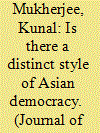

|
|
|
|
|
| Publication |
2010.
|
| Summary/Abstract |
For a long time, especially through orientalist writings, Eastern or Asian political systems were seen as inherently authoritarian and as the antithesis of the West or Western political systems. Although there is some truth to this, there are aspects of Asian politics and culture which are very much in keeping with Western understandings of political liberalism and this paper tries to focus on some of these similarities. The paper tries to look into the question, 'Is there is a distinct style of Asian democracy'? The paper argues that there are aspects of Asian culture and politics which sit comfortably with Western notions of liberalism and other aspects which do not. However, for the aspects which do not, these have a lot to do with politicians using aspects of the Asian political tradition, like acceptance of hierarchy and respect for authority, to consolidate their own position when their power base lacks political legitimacy. Before making an assessment of the political systems in Asia, one also has to look at specificities and the particular historical, geographical and sociological context each country is grounded in. This paper has a special focus on South and East Asia and thus makes use of a comparative approach, whilst trying to answer its research question.
|
|
|
|
|
|
|
|
|
|
|
|
|
|
|
|
| 2 |
ID:
101492
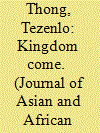

|
|
|
|
|
| Publication |
2010.
|
| Summary/Abstract |
Does socio-political circumstance have an impact on religion, religious conversion or religious beliefs? Assuming it does, how does such circumstance shape the theology and beliefs of a people who exist amid a turbulent socio-political situation? In this paper I will analyze the impact of socio-political turbulence on Nagas and assert that among the Nagas there is a correlation between the height of political violence and the rapid conversion to Christianity. The long history of colonial violence and suppression coupled with the undermining of Naga cultural values and practices by the process of proselytization created an atmosphere conducive for conversion to Christianity and shaped the Nagas' theological choices.
|
|
|
|
|
|
|
|
|
|
|
|
|
|
|
|
| 3 |
ID:
101499
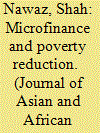

|
|
|
|
|
| Publication |
2010.
|
| Summary/Abstract |
To evaluate the competing claims on the impact of microfinance programs on multidimensional poverty, a village study in Bangladesh was conducted where three microfinance programs had been operating for more than five years. The study found that microfinance has resulted in a moderate reduction in the poverty of borrowers, as measured by a variety of socio-economic indicators, but has not reached many of the poorest in the village. To make microfinance a more effective means of poverty reduction other services such as skills training, technological support, education and health related strategies should be included with microfinance.
|
|
|
|
|
|
|
|
|
|
|
|
|
|
|
|
| 4 |
ID:
101494


|
|
|
|
|
| Publication |
2010.
|
| Summary/Abstract |
This article examines the role of regulation, competition and market structure on the success of mobile phone sector liberalization. The findings of the study suggest that deregulation of the telecommunications sector has generated competition and changed the market structure which has had a significant influence on mobile phone service pricing. However, limited liberalization, a concentrated market and a weak regulatory regime during 1997-2004 allowed mobile phone firms to keep mobile tariffs high. Since 2005, full liberalization of the mobile phone sector including the launching of a mobile phone service by a state-owned mobile firm and a strong rival as well as the emergence of an effective regulator brought stiff competition in the sector.
|
|
|
|
|
|
|
|
|
|
|
|
|
|
|
|
| 5 |
ID:
101497
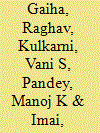

|
|
|
|
|
| Publication |
2010.
|
| Summary/Abstract |
The objective of this analysis is mainly to construct an intuitive measure of the performance of the National Rural Employment Guarantee Scheme (NREGS) in India. The focus is on divergence between demand and supply at the district level. Some related issues addressed are: (i) whether the gap between demand and supply responds to poverty; and (ii) whether recent hikes in NREGS wages are inflationary. Our analysis confirms responsiveness of the positive gap between demand and supply to poverty. Also, apprehensions expressed about the inflationary potential of recent hikes in NREGS wages have been confirmed. More importantly, higher NREGS wages are likely to undermine self-selection of the poor in it.
|
|
|
|
|
|
|
|
|
|
|
|
|
|
|
|
| 6 |
ID:
101496
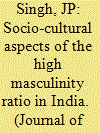

|
|
|
|
|
| Publication |
2010.
|
| Summary/Abstract |
The paper aims to explicate those factors accountable for the continuing imbalance in the sex ratio and its further masculinization over the whole of the 20th century. Here it is contended that the traditional practice of female infanticide and the current practice of female foeticide in the contemporary period, especially in the north-west and Hindi-speaking states, have significantly contributed to the high masculinity ratio in India. In addition, increasingly higher survival ratios of male children, particularly from the 1951 census onward, have been the prime reason for a declining proportion of females in the Indian population. As the Indian value system has been imbued with a relatively higher preference for sons, improvements in health facilities have benefited males more than females, giving rise to a highly imbalanced sex ratio in the country. This scenario, however, has steadily tended to alter in favour of greater balance in sex ratio.
|
|
|
|
|
|
|
|
|
|
|
|
|
|
|
|
|
|
|
|
|